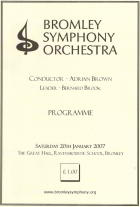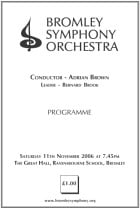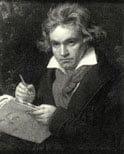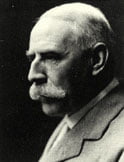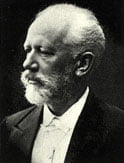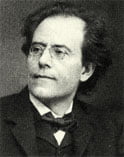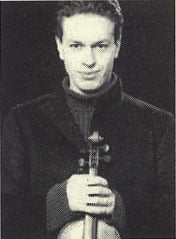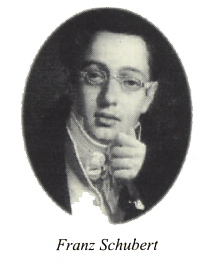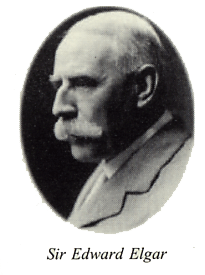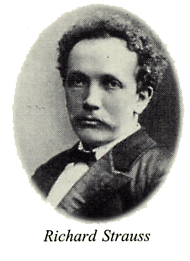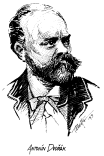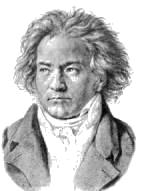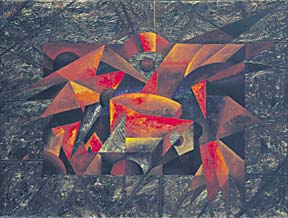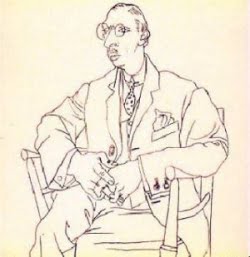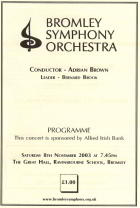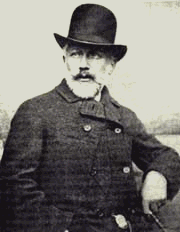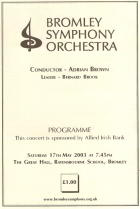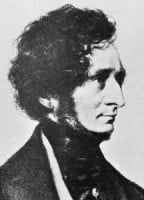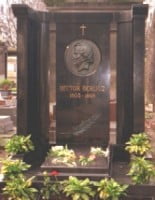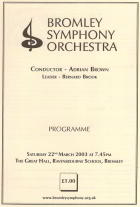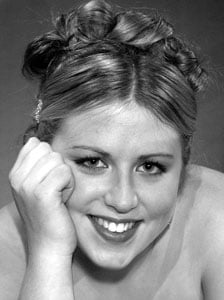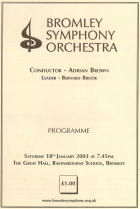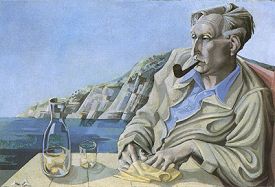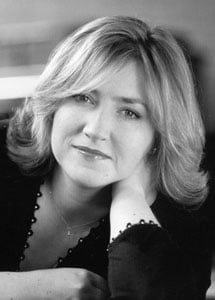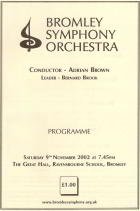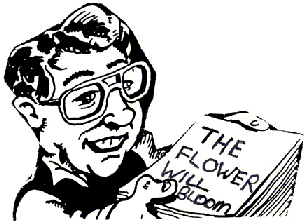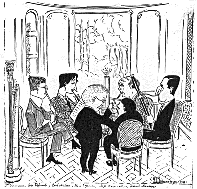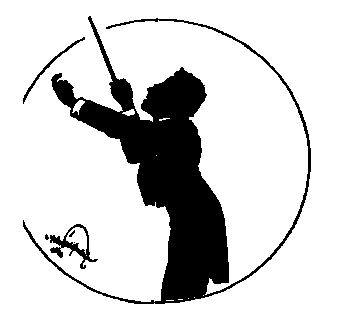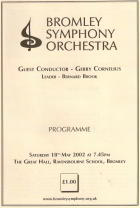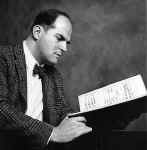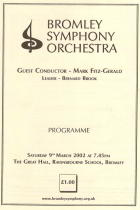
Sergei Rachmaninov |  Wagner Overture from ‘Rienzi’ Wagner Overture from ‘Rienzi’ Arnold Little Suite No. 1 Haydn Trumpet Concerto
soloist: Matthew Fletcher RachmaninovSymphony No. 2 Rachmaninov’s great symphony has a gloriously rich sound of broad tunes, with passionate declamation. Wagner’s early opera celebrated the life of 14th century Roman populist leader Rienzi on the grandest scale. By contrast, Haydn offers a joyful and radiant concerto. |
|

Dmitri Shostakovich | Richard Strauss Don Juan Mozart Piano Concerto No. 23 K488
soloist: Tracey Renwick Shostakovich Symphony No. 10 Shostakovich’s symphony was in part a public reaction to Stalin’s death, and in other ways an enigmatic and private work entwining personal mottos from an emotional relationship. Its dramatic power is complemented by Strauss’s brilliant tone-poem, and the sublime intimate melodies of Mozart’s concerto. |  |
|
 Ludwig van Beethoven | ‘Simply Famous’Grieg “Peer Gynt” (selection) Mozart Horn Concerto No. 3
soloist – Roy Banks Beethoven Symphony No. 3 – “Eroica” Why does some music gain universal popularity and fame? Great tunes, freshness, vitality, romance, drama – all are shown in this concert. Grieg’s spirited portrayal of the adventures of ‘Peer Gynt’ is among the most played orchestral music. Mozart’s humour and high spirits in a showpiece for the French horn has immediate appeal. And on every hearing, the revolutionary drama of Beethoven ‘Eroica’ strikes the listener anew with the shock of a journey from tragedy to triumph. |
|
 Sir Edward Elgar | ‘The Composer’s Inspiration’ Bach (arr Elgar) Fantasia & Fugue in C Minor Anthony Payne “Spring’s Shining Wake” Elgar (realized Payne) Symphony No. 3 The idea of this very colourful orchestration of Bach’s great organ work came from a meeting between Elgar and Richard Strauss. After the death of his wife in 1920, many believed that Elgar’s inspiration had faded. However, reviewing the sketches for Elgar’s unfinished last symphony, Anthony Payne found the music ‘leapt from the page’ for his acclaimed and deeply satisfying completion which he will be introducing at this concert. We celebrate Payne’s own 70th birthday with a performance of his serene work, which was inspired by Delius’s ‘In a Summer Garden’. |
|
 Pyotr Ilyich Tchaikovsky | ‘Darkness into Light’ Sibelius “Pohjola’s Daughter” Shostakovich Violin Concerto No. 1
soloist – Alex Afia Tchaikovsky “The Nutcracker” Ballet – Act 2 Sibelius’s overture tells a story from Finland’s epic poem ‘The Kalevala’ in which an old magician tries to woo an alluring, beautiful maiden. We welcome Shostakovich’s Centenary year with this concerto, which begins darkly with driving energy, and after a subdued slow movement with one of his warmest melodies, ends in a festive finale. By contrast Tchaikovsky’s ‘Nutcracker’ offers a fairy tale entertainment with charming and popular dance music. |
|
 Gustav Mahler | ‘The Sounds of Nature’Mahler Symphony No. 3 with “The Carroll Singers” and Trinity Boys’ Choir
mezzo soprano – Miriam Power In Mahler’s romantic vision ‘a symphony is like the world, it must contain everything’. His third symphony, written at his retreat in the Austrian Alps in 1893-4, was first titled ‘A Summer Morning’s Dream’ and is a wonderful orchestral pageant of nature and human experience. It includes a sublime movement for soloist and chorus, and ends in an exultant finale ‘What Love Tells Me’. |
|
 | BerliozOverture ‘Le Corsaire’ Brahms Violin Concerto
soloist – Shlomy Dobrinsky Prokofiev Symphony No. 5 Le Corsair is a concert showpiece, with the swashbuckling pirate, swift and brilliant in adventure, calmed with beautiful expressive melody, providing images of Berlioz’s own passionate personality. In more reflective style, Brahms’s Violin Concerto is full again of lovely melody and rich orchestration, in a work written for his great friend and adviser Joseph Joachim. Finally, a world away in war-torn Soviet Russia, written by Prokofiev in 1944 the Symphony No.5 is a glittering and heroic work, full of sharp wit and flowing song-lines, contending with powerful external forces. |
|
 | Glinka Overture ‘Ruslan and Lyudmila’ Tippett Ritual Dances from ‘A Midsummer Marriage’ Schubert Symphony No. 9 – (‘Great C major’) Glinka’s overture to his opera Ruslan and Lyudmila is full of sweeping melodies and driving rhythms, describing the battle against sorcery to win the hand of an enchanted princess. In Michael Tippett’s opera The Midsummer Marriage, the lovers’ path is also attended by magic, portrayed in the Ritual Dances of the seasons, ending with a rapturous climax in the summer fire-dance. The last work, Schubert’s ‘Great’ Symphony No. 9, of striking rhythmic vitality and sheer lyrical beauty, was famously described as ‘heavenly length’ by Schumann. |
|
 | Walton Overture ‘Scapino’ Bliss BalletSuite ‘Checkmate’ Elgar ‘Falstaff’ – A Symphonic Fantasy Scapino, a servant in the Italian Art of Comedy, is the subject of one of Walton’s most popular works. It opens in a blaze of bright light and high spirited mischief, leading on to Scapino the lover in a serenade, before more escapades. The ballet Checkmate by Arthur Bliss (later knighted and Master of the Queen’s Music) depicts a contest on the chessboard between good and evil, through music of fantasy and harmonic freshness. Elgar’s symphonic poem Falstaff takes us back to the theatre, with a portrait of Shakespeare’s larger than life character, a chancer, charmer and braggart, ultimately broken hearted in his rejection and death. |
|
 | MozartSymphony No. 39 Richard Strauss ‘Ein Heldenleben’ (‘A Hero’s Life’) Our first concert of the season contrasts the classical elegance of Mozart with the extravagant expression of Richard Strauss. Of Mozart’s last three symphonies, No 39 is least played, a work of inspiration, joyful exuberance and sombre introspection, that can still surprise and delight. In A Hero’s Life Strauss portrays his life as an epic struggle, between his inner life and love for his wife Pauline, a famously temperamental singer, and the outer world, battling for understanding and recognition of his work against his adversaries – the critics! |
|
Franck Le Chasseur Maudit Bruch Scottish Fantasy Dvořák Symphony No. 9 From the New World opus 95 in E minor 
Franck vividly depicts an “accursed huntsman” who is damned because he goes hunting on a Sunday. The ‘Scottish Fantasy’ is Bruch’s “other” great work with solo violin, and incorporates portions of Scottish folk tunes in each of its four movements. To finish our season we celebrate the centenary of Dvorák’s death in the best possible way, by performing the ‘New World’, his most famous and popular composition. |
|
Dvořák Serenade op 44 in D minor Wagner Wesendonk Lieder Vaughan Williams Symphony No. 3 (Pastoral) 
Dvořák’s D minor Serenade is one of the really great works in the repertoire for wind ensemble. We are delighted to welcome back Malmfrid Sand to sing the Wesendonk Lieder. Wagner had an intense relationship with the German poet and writer Mathilde Wesendonk, and set five of her poems to music. A wordless soprano also features in the last movement of the ‘Pastoral’ Symphony, which is close to the spiritual centre of Vaughan Williams and has intense passions running deep below its largely dispassionate surface. |
|
Sibelius Symphony No. 7 Nielsen Flute Concerto Burak Besir Flute Beethoven Symphony No. 2 op 36 in D Major 
Two contrasting symphonies sandwich Nielsen’s delightful concerto, which has been described as “piquant, fluent and with no dearth of humour”. Beethoven’s Second Symphony is very much an example of pure “classical” style, whereas Sibelius described his own later works as offering the public “pure cold water”, while other composers were engaged in manufacturing cocktails. Burak Besir (flute) is a 2003 winner of The Philip and Dorothy Green Award for Young Concert Artists. This scheme, run by “Making Music” (formerly known as the National Federation of Music Societies) has been instrumental in launching the careers of many of today’s stars. Burak Besir was born in Cyprus. After early training in Cyprus and Ankara, he moved to the UK and took his MMus Performance Degree at the Royal Scottish Academy of Music and Drama. He has given recitals in Cyprus and Istanbul as well as in England. |
|
Khachaturian/Tchaikovsky/Stravinsky  The Firebird by Andrey Anisimov. Khachaturian Adagio of Spartacus and Phryggia The Adagio from the ballet Spartacus of 1954 will be better known to many as the theme of The Onedin Line. Tchaikovsky Swan Lake Suite Opus 20a (excerpts) Swan Lake is the story of Prince Siegfried who falls in love with Princess Odette, who had been turned into a swan by the evil Rothbart. It was first performed in Moscow in 1877, but the form was much more advanced than the company was used to and the performance was not coherent and not well received. The version choreographed by Pepita and Ivanov, premiered in St Petersburg in 1895 is the one that survived. Swan Lake contains some of Tchaikovsky’s most memorable music. 
Stravinsky The Firebird (Complete, 1910) The Firebird, written for the Ballets Russes, shows the influence of Tchaikovsky, Rimsky-Korsakov and other Russian masters as well as Debussy. It is full of the most wonderful, exotic orchestral colour, much of it familiar from the popular suite. In the 3 years following his use of rhythms and folk songs became more advanced resulting in the ballets Petrushka and the Rite of Spring. 
|
|

Pyotr Tchaikovsky | Walton | Orb and Sceptre | | Shostakovich | Jazz Suite No. 2 | | Gershwin | An American in Paris | | Tchaikovsky | Symphony No. 5 |
The march Orb and Sceptre conjures up the pomp and ceremony of the coronation of Queen Elizabeth II, for which it was written 50 years ago. In his Jazz Suites, Shostakovich really lets his hair down. They are not really jazz at all, but simply great light music in the style of the dance music of the era. Unlike the first suite, Jazz Suite No. 2 is scored for a large orchestra. Gershwin’s light-hearted An American in Paris has closer jazz influences, and portrays the impression of an American visitor to Paris as he strolls about, absorbing the sounds and atmosphere of the city. Tchaikovsky’s Symphony No. 5 is one of his most deeply felt works, and also one of his most popular. Its opening mood of brooding self-doubt is followed by vivid contrasts, frenzied climaxes, a celebrated slow movement, an elegant waltz, ending with the rich orchestral splendour of an exultant finale. 
|
|

| Verdi | Sicilian Vespers | | Berlioz | Romeo and Juliet excerpts | | Arnold | Symphony No. 5 |
The ‘Sicilian Vespers’ is one of Verdi’s many popular operatic overtures, using the tunes from the opera to set the scene.  
Berlioz, whose bicentenary is this year, was a great admirer of Shakespeare. Like many other composers, he was especially drawn to the drama and passion of the story of ‘Romeo and Juliet’. Sir Malcolm Arnold is a modern composer, who is perhaps not as “fashionable” as he might be since his music is instantly approachable, witty and tuneful, qualities that abound in his 5th Symphony of 1960. His music is familiar to most people through his prolific film scores, including Bridge on the River Kwai and his award winning Inn of the Sixth Happiness. For more information on the man and his music visit the excellent official web site. 
|
|

Copland Clarinet Concerto Kodály Háry János Rachmaninov Symphony No. 1 
Sergei Rachmaninov 1873-1943 Aaron Copland wrote his Clarinet Concerto for Benny Goodman and so it contains hot jazzy elements. We welcome as soloist the brilliant young Sarah Williamson, fresh from her recent successes at prestigious young musicians competitions. 
Sarah came to the attention of the British musical public very recently, in the 2002 BBC TV ‘Young Musician of the Year’ competition in which she won the woodwind prize. In the concerto final, she gave a highly memorable performance of the Copland Clarinet Concerto with the BBC Symphony Orchestra conducted by Sir Andrew Davis. Then, representing Britain and competing against twenty other ‘Young Musicians’ from around Europe, Sarah was awarded second prize in the Eurovision ‘Young Musician’ competition in Berlin. She is now studying at the Paris Conservatoire. An orchestral sneeze, signifying that what follows is of doubtful veracity, introduces Háry János’ far-fetched tales which make the most outrageous claims for his gallantry. The 24-year-old Rachmaninov was so upset by the poor first performance of his First Symphony that he destroyed the manuscript score. Some 50 years later the orchestral parts were discovered and the importance of the work was then recognized. 2003 is the 60th anniversary of his death (and the 130th anniversary of his birth). 
|
|

Brahms Academic Festival Overture Beethoven Piano Concerto No. 3 Walton Symphony No. 1 
William Walton 1902-1983 Brahms Academic Festival Overture Brahms did not receive a college education, but was the recipient of honorary doctorates from Cambridge and Breslau universities. His thank you to Breslau in 1880 was the Academic Festival Overture based on student drinking songs, concluding with Gaudeamus igitur and he was delighted when students sang along. Beethoven Piano Concerto No. 3 Lucy Parham Piano Beethoven’s Third Piano Concerto is the first of his mature concertos. It was written about the same time as his ‘Moonlight’ and ‘Pathétique’ sonatas and is full of their passion and magic. We are delighted to have Lucy Parham as our distinguished soloist. The first performance in 1803 also was also the premiere of Beethoven’s Second Symphony and the Oratorio Christ on the Mount of Olives, as well as a performance of his First Symphony. 
Lucy Parham is acknowledged as one of Britain’s finest pianists. Since winning the BBC TV ‘Young Musician of the Year’ Piano Class in 1984, she has performed throughout the UK and abroad as soloist with many major British and foreign orchestras. She has appeared regularly at all the major London venues and at many international festivals. She has also made many successful commercial recordings, one of which won the prestigious BBC Music Magazine “Critics’ Choice of the Year”. She has also broadcast on ITV, BBCTV and Radio 3. Walton Symphony No. 1 We mark Walton’s centenary year with a performance of his First Symphony, one of the major masterpieces of British music. It progresses from an insistent, surging opening movement, a snarling scherzo and a cool, melancholy slow movement, to a glorious triumphant finale. Walton took more time than planned to conclude the symphony to his satisfaction, and its first performance in 1934 did not include the finale. It was premiered in its entirety in 1935. 
|
|

Guest conductor Gerry Cornelius  Adrian Connell The Flower Will Bloom (first performance) Adrian Connell The Flower Will Bloom (first performance)
The symphonic scherzo by Bromley’s Adrian Connell was developed from an original commission for a small song cycle emanating from his association with the Bromley Œcumenical Singers.  Nielsen Violin Concerto Violin Natasha Elvin Nielsen Violin Concerto Violin Natasha Elvin
Nielsen wrote his first concerto for Peder Møller of the Royal Danish Orchestra, who gave the première on 28 February 1912 in Copenhagen. Wonderful musical invention blends with pyrotechnics for the soloist. Carl Nielsen wrote his Flute & Clarinet concertos for members of the Copenhagen Wind Quintet.  Mahler Symphony No. 1 Mahler Symphony No. 1
First performed in Budapest in 1889, the symphony embarks on a journey through the countryside. The second movement has a rustic feel in the style of a Ländler. Death is introduced by solo double bass in the third movement’s ghostly canon based on ‘Bruder Jakob, schläfst du noch’ (Frère Jacques). The last movement bursts in with ‘the cry of a wounded heart’, but concludes triumphantly with the full, enlarged orchestra. Background Picture: Egeskov, on the island of Fyn, Denmark. Page design David Young.. 
|
|

Guest conductor Mark Fitz-Gerald  Schumann Konzertstück for 4 Horns Schumann Konzertstück for 4 Horns
Soloists Gillian Jones, Oliver Tunstall, Mary Banks & Roy Banks Schumann composed this showpiece exploiting the capabilities of the recently introduced valved horn while he was living in Dresden in 1849. It demands extraordinary virtuosity and stamina from our ‘home’ team of soloists.  Janacek Taras Bulba Janacek Taras Bulba
Janacek composed many of his finest and most original works when he was over the age of sixty. This portrayal of Gogol’s story of the Ukranian Cossack partisan’s campaign against the Poles is perhaps influenced by the Czech strive for independence during the first world war. Organ and bells augment the normal full orchestra.  Dvorak Symphony No. 5 Dvorak Symphony No. 5
Although less often performed than the later symphonies, the F-Major symphony, first performed in 1879, has all their tunefulness and ebullience. Guest conductor Mark Fitz-Gerald  Mark Fitz-Gerald completed his studies at the Royal College of Music in 1977, where his professors included Norman Del Mar and where he won all the major prizes for both orchestral and operatic conducting. From 1983 to 1987 he was Artistic Director of the RIAS Jugendorchester (West Berlin ) where his innovative Filmharmonic Concerts received much acclaim and were later made available on CD. He returned there to continue the series with the Berlin Rundfunkorchester in 1992. Mark Fitz-Gerald completed his studies at the Royal College of Music in 1977, where his professors included Norman Del Mar and where he won all the major prizes for both orchestral and operatic conducting. From 1983 to 1987 he was Artistic Director of the RIAS Jugendorchester (West Berlin ) where his innovative Filmharmonic Concerts received much acclaim and were later made available on CD. He returned there to continue the series with the Berlin Rundfunkorchester in 1992. Background picture: Brno station, towards the end of Janacek’s life. Page design David Young. 
|
|



